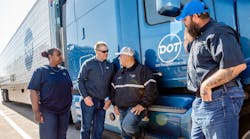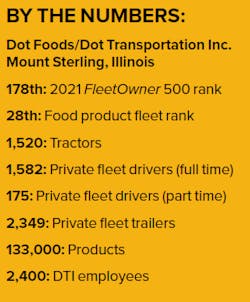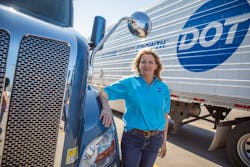Early one Saturday morning in March 2020, executives at Dot Foods and its private fleet, Dot Transportation Inc. (DTI), started to anticipate that a novel coronavirus was about to change everything. “At that moment, we realized we needed to do something and couldn’t wait a moment longer,” Duskee Kassing, director of operations at DTI, recalled.
Texts and phone calls started going out to key players in the Mount Sterling, Illinois-based company with 27 terminals and 12 distribution centers (DCs) across the U.S. and two more in Canada. With 4.2 million sq ft of warehouse space, the company has more than 130,000 products distributed across all 50 states for foodservice in restaurants and schools, convenience stores, and retail stores; it also delivers things such as food ingredients, bakery items, vending equipment, and other supplies.
DTI, the private fleet of Dot Foods, is primarily a food redistributor that works off a hub-and-spoke model, transferring its products from distribution centers, Kassing said. The company, which ranks No. 178 on this year’s FleetOwner 500 Top Private Fleets list, also has a presence inside stores with drivers delivering racks and stocking displays at grocery and convenience stores. Dot Transportation Inc. was named the winner of the annual FleetOwner 500 Private Fleet of the Year awards, which were announced during the National Private Truck Council's 2021 conference in Cincinnati on June 15.
Kassing said the company put a premium on communication—not only with its customers but with its employees, which include more than 1,500 full-time drivers. “We felt it was very important for all employees to understand what we were doing, to be very transparent about what we knew, what we were anticipating, the different changes that we were trying to make in the business, and how fast that was coming at us,” she said. “That really, in my mind, led to our success in the business.”
Weathering the pandemic
Kassing said she’ll never forget that Saturday morning or how the people of Dot came together to weather COVID.
“Like everyone else, we had our challenges during the pandemic, but the business has grown significantly year over year,” Kassing said in May. “As we approach the midyear point, we are already surpassing the volume that we serviced in 2019. Last year was obviously unique and had its challenges, but we’re getting our year rocking now.”
The foodservice industry is a big part of Dot Foods. More than 90% of DTI’s nearly 2,500 trailers are multi-temp. When the COVID-19 pandemic pushed regions of the country to shut down restaurants and schools, “it certainly did impact our core business there,” Kassing said. “There’s no doubt about that, so we kind of reevaluated ourselves.”
Dot, which was founded as Associated Dairy Products Company in 1960, has never laid off an employee. Kassing said that as the pandemic began, there was a push among executives to ensure that tradition continued. They settled on a hiring freeze and some selective furloughs.
“From a driver perspective, we really stepped back and said, ‘OK, what can we do to backfill that core business that we would normally have,” Kassing said. “So, we went out and began looking for what we call custom hauls.”
While less of its own freight needed to be moved during the spring of 2020, there was a significant need for freight movement across the country as many Americans revamped their lives during various lockdowns and stay-at-home orders. “We shifted a lot of our own internal employees into roles that they had not been in before,” Kassing said. “It allowed us to go out and find some of those brokered loads. And we would use those to get our drivers in position to pick up our freight to return back to our DC locations.”
DTI is always looking to fill those empty miles as a general business practice. “But instead of just looking for one lane that we had empty miles on, we shifted gears and began to use that as the beginning of the lane to set ourselves up to be in other locations that we needed to be in,” Kassing said.
Dot has been adding new distribution centers regularly, Bryan Langston, president of DTI, told FleetOwner. “Obviously, last year was crazy and slowed us down a bit. But we are back on the same trajectory now—our volume is through the roof as the country wakes up.”
With restaurant activity nearing pre-pandemic normal more than a year later and most schools reopening, DTI has lifted its hiring freeze as the U.S. returns to normal. “We certainly lost some ground,” Kassing conceded. “As that tap starts to run back on and that volume starts coming on, you can’t just frontload your business with another 200 drivers that you need.”
With volume surging and capacity tightening, Langston said the private fleet’s vast network is helping it stay nimble in 2021. “We can look at our network of distribution centers, and we can rightsize capacity,” he said. “If, for example, our Maryland facility is scrambling more than our New York facility, we can move customer service territories between DCs to take advantage of where we’re doing a better job on hiring or we have more space in the warehouse.”
This strategy, Langston said, is what’s helping DTI grow and recover from COVID at the same time. “When we can spread the pain across the country, it makes us more successful with that approach and that’s what we’re constantly working on right now,” he said. “It takes a lot of collaboration across many departments.”
Driver focused
While DTI has used some other carriers to manage some of its freight this spring, Kassing said the company is “in very fast motion to hire more good, quality drivers.”
“We focus tremendously on safety in our business and still want to hire the right driver that wants to be here for a career,” she said of the meticulous process DTI uses to hire commercial drivers. “We don’t want to make mistakes through that process—just to hurry up and get drivers in the door. We take a lot of pride in our turnover rate—we always have. We don’t want to jeopardize that. Right now, we’re very focused on getting those right drivers in the door to get us where we need to be.”
One of the reasons DTI seeks out drivers who want to make a career with Dot is because of how much time and investment is made in training the fleet. Kassing said company driver hires range from students to experienced truckers. The onboarding program for all drivers includes an in-house two-week finishing program, followed by up to 10 weeks of on-the-road training, depending on the new driver’s experience.
“We also have a variety of job types,” Kassing said. “We have no-touch freight that’s over the road, regional; then we have customer delivery specialists, which is also regional work, but they actually go to our customers’ bump docks, make deliveries, and handle cases.”
Along with training and pushing for road safety, DTI focuses on personal safety and driver health. “We are always telling drivers we want them to return back home healthy—if not healthier—than when they left,” Kassing said. “For us, investing that time in them and making them as good as they can possibly be when they’re home to play with their kids or grandkids is very important to us.”
To support this driver health focus, DTI has an in-house occupational health team. In addition, almost every driver facility has a physical therapist on staff who can work with drivers at the first sign of an ache or pain. And Kassing said they tell drivers it doesn’t matter if they got hurt on the job or at home. “We really encourage them to come in and tell us about it,” she said. “And we’ll try to work on a conservative care program that gets them healthy. A lot of times, that includes stretches or an exercise program followed by regular check-ins with that occupational team to make sure that they’re making progress.”
Each quarter, DTI offers a program for drivers that focuses on the health of a different body part. For drivers handling cases, it might be shoulders or knees. “We’ll talk to them about it and give them tests to see where they are in terms of flexibility with this part of the body,” Kassing said. “The ones that might be rated lower, we say here is something that you can do proactively to try to increase that range of motion and set yourself up to not get injured.”
In the community
Giving back is a big part of Dot, Kessing said. “There is always some type of community event that we are volunteering for or providing donations to,” she said. “That’s a large part of our culture as well. It’s truly the core of who we are.”
In 2020, Dot donated nearly 8 million pounds of food worth more than $16 million. Those donations are focused on charitable organizations in the communities surrounding each of DTI’s 14 distribution centers in North America. “It’s a big part of our culture to give back to communities,” Kessing said. “I’ve worked here for 26 years, so I had the honor of working with the founder of our business, RT, or Robert Tracy. And something that he and his wife, Dorothy, were very passionate about from the get-go is giving back to the communities that we live in and building them up. It has been this way through the course of my career here and it continues to grow … It makes you feel very good about being in a place that encourages that kind of work.”
Langston said Dot is constantly looking for ways to reduce food waste. Along with donating to food banks and food pantries, the company offers its employees significant discounts on products when it has surpluses.
Leading-edge
DTI has been testing alternative-powered trucks in California. “I don’t know yet if we’ll move forward with it or not,” Kassing said. “We’ve looked at different options to try to encourage and prepare ourselves for future regulation changes that may come down the line. You never want to be surprised by that. You at least want to understand how it could or couldn’t work in your business.”
Langston said the company is challenging itself to look to alternative energy, from hydrogen fuel cells to battery electric. DTI is currently looking into potential equipment to test. “I think we'll start with most of the demo stuff next year—after we get out of this capacity revival,” he said. “We’ll continue to be on the leading edge; we won’t be the bleeding edge, but we won’t be far behind it.”








